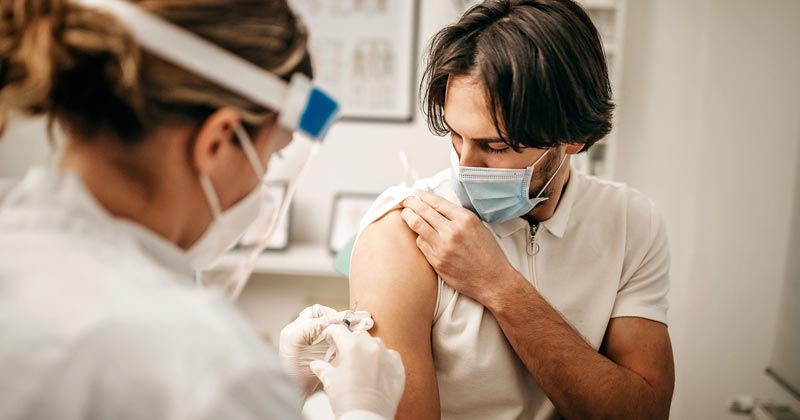
A team of scientists here at CHR in Portland are broadening our knowledge of COVID-19 vaccine safety and effectiveness and helping shape national guidelines.
Throughout the COVID-19 pandemic, Americans have looked to the Centers for Disease Control and Prevention for guidance on how to stay safe and healthy. In addition to its own work, the CDC has relied on doctors and scientists around the country — including right here in Portland, Oregon — for insights.

Allison Naleway
Allison Naleway, PhD, and her team at the Kaiser Permanente Northwest Center for Health Research in Portland have contributed some of the research critical to shaping our collective knowledge about the safety and effectiveness of the 3 COVID-19 vaccines currently in use in the United States. Scientists at the center conduct research in medical areas that include health economics, obesity prevention, opioid addiction, mental health, and infectious disease.
Naleway, a distinguished investigator and associate director for science programs, has worked at the center for more than 18 years. Of course, she hasn’t always focused on COVID-19. Before the pandemic, her work focused on influenza and human papillomavirus vaccines. When the pandemic arrived, however, “Everybody dropped what they were doing and began work on it,” says Naleway.
Here, she describes her research, which is done with a local Portland-based project team in coordination with the CDC, state health departments, and clinical partners.
Describe your most recent research, which was cited by the CDC.
In one study, health care personnel and first responders around the country submit nasal swabs and blood specimens for regular screening. Since we’ve tracked them for more than a year, we can see how they’ve fared as the virus has changed. Factors we look at include who has been vaccinated, which vaccines they received, whether they became infected or not, and how sick they got from the virus. We’ve found that the vaccines are very effective at preventing infection — over 90% for the original coronavirus, with slightly lower effectiveness against the delta variant. This data also shows that asymptomatic spread is very rare.
In another study, we looked at data from electronic health records across 9 states to determine vaccine effectiveness against hospitalization and emergency room or urgent care visits. This study showed vaccines provide very good protection against hospitalization, and it revealed performance differences among the 3 vaccines.
What is the significance of these findings?
By closely monitoring the data, we can quickly see variations in vaccine effectiveness among different groups of people. For example, people who are immunocompromised aren’t building up good antibody responses, and vaccine effectiveness wanes faster in people over 75. The CDC and Food and Drug Administration can then make recommendations and policy based on this information and ensure that vaccines are used where they’re most needed.
What have you learned about the safety of the COVID-19 vaccines?
These vaccines are very safe. We look at the data carefully and frequently. We have identified certain risks in specific groups of people, but we know that problems stemming from the vaccines are very rare among the hundreds of millions of doses that have been delivered.
How has past research pushed this work forward?
We’ve had these research and data systems in place for decades. What’s different about COVID-19 is how much money and effort have been put toward fighting it. We were able to rapidly bring these vaccines through clinical trials not because we cut corners, but because everybody went all in on COVID-19 research. And we were able to do that because we had that infrastructure in place already.
Will our experience with COVID-19 help future vaccine research?
The new mRNA vaccine technology is a huge scientific leap forward. We’ve seen that when things matter and people pull together, we can accomplish amazing things. The amount of energy and dedication it took to get these vaccines out is phenomenal. Perhaps we’ll be more prepared for the next pandemic.
What’s next for your team?
We’ll continue our research on vaccine effectiveness and likely will continue our studies on the safety and effectiveness of vaccines in children soon.